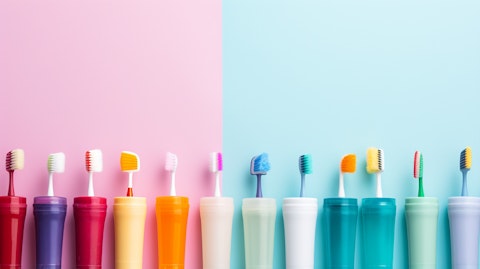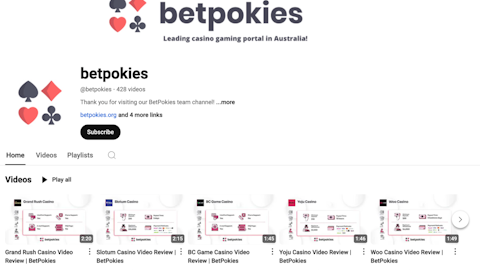We recently compiled a list of the 10 Best Beauty Stocks To Buy According to Short Sellers. In this article, we are going to take a look at where Colgate-Palmolive Company (NYSE:CL) stands against the other beauty stocks.
The US beauty market, which is seeing major shifts in distribution and customer interaction, continues to be a key area of interest for stakeholders. Beautymatter CEO Kelly Kovack underlined that consumer-driven channels have replaced traditional distribution strategies, compelling companies to engage with customers wherever and whenever they’re most comfortable.
According to a report, the US beauty market is expected to grow to $114 billion by 2027. On the other hand, the prestige channel saw its third straight year of double-digit growth in 2023, rising by 14% to $31.7 billion, outpacing the mainstream market across make-up, skincare, hair, and fragrance, according to the February 2024 CEW conducted annual “Global Trend Report” virtual event. Luxury brands represent the fastest-growing segment, with sales surpassing $16 billion, although being smaller at 11% of the market.
Bigelow Trading’s Daina Nadler emphasized the value of multichannel distribution plans that are customized to a wide range of consumer buying preferences. According to John Cafarelli, CEO of Beautymatter, 87% of US beauty lovers prefer in-store shopping, and 80% of them frequent stores that specialize in beauty products. In-store shopping continues to be popular. In order to increase traffic and loyalty, Space NK’s Noah Rosenblatt and H-E-B’s Jeanne Tamayo stressed the significance of creating compelling retail spaces and solid brand-consumer relationships.
In contrast, although offline retail in China is declining by 4%, e-commerce and social commerce, particularly Douyin, are growing at 9% and 57%, respectively, according to Nielsen IQ. China is a resilient beauty market, and despite all of the difficulties following the pandemic, it remains the world’s second-largest beauty market, posing numerous challenges for international suppliers notes Vice President of Nielsen IQ Gautam Seth. He also points out that local companies are more successful because they employ local ingredients and have a strong cultural connection. Industry giants like Jina Lee of Urang and Kim Da Jeong of Lotte Department Store have stressed the importance of consumer knowledge about ingredients and product efficacy.
The emphasis on diversity is also influencing the global beauty market, although many individuals continue to feel underrepresented in health and beauty advertisements as per Circana. Expectations from consumers about varied representation in terms of gender, color, age, ability, body size, and sexual orientation are at an all-time high. A general market and a multicultural market will not differ by 2044 due to the majority-minority population in the United States. According to a study by SeeMe Index and Circana, brands that are certified inclusive grow 1.5 times faster than brands that are not. Additionally, the likelihood of seeing individuals over 55 in these brands’ advertisements who equally represent straight and homosexual partnerships is 2.5 times higher than that of less inclusive brands, which are 12 times more likely to just feature straight relationships.
Looking ahead, the global beauty market is expected to generate retail sales of over $580 billion by 2027, with an annual growth rate of 6% per report.
One area gaining attention and stimulating beauty business is the growing consumer interest in wellness within beauty. According to a survey on wellness trends in 2024, 82% of US consumers, 87% of Chinese consumers, and 73% of British consumers now rank wellness as a top or important priority in their daily lives. The Goop, one of the “Most Successful Celebrity Beauty Companies in the World,” philosophy is that “beauty is wellness and wellness is beauty.” Beauty firms are entering this space. A massive beauty brand and the Stanford Institute on Longevity have teamed up to develop a new age-reversal technology-powered product.
Methodology:
We sifted through holdings of beauty ETFs and online rankings to form an initial list of 20 beauty stocks. Then we selected the 10 stocks that had the lowest percentage of their shares shorted. The stocks are ranked in ascending order of the lowest percentage of their shares shorted.
Why are we interested in the stocks that hedge funds pile into? The reason is simple: our research has shown that we can outperform the market by imitating the top stock picks of the best hedge funds. Our quarterly newsletter’s strategy selects 14 small-cap and large-cap stocks every quarter and has returned 275% since May 2014, beating its benchmark by 150 percentage points. (see more details here)

An array of toothpaste, toothbrushes, and mouthwashes on a bright background, highlighting the company’s oral care products.
Colgate-Palmolive Company (NYSE:CL)
% of shares shorted: 1.00%
Colgate-Palmolive Company (NYSE:CL) was established in 1806, and since then, it has developed into a major force in the home and personal care industries. Apart from its trademarked oral care range, which contributes over 40% of its overall revenue, the company also produces shampoos, shower gels, deodorants, and homecare items that are distributed to more than 200 nations.
About 70% of its entire revenue comes from sales abroad, of which 45% comes from developing countries.
Although there are many worries about customers’ financial stability and eventually their willingness to pay for the essentials in the firm’s portfolio, the company is carefully handling the unpredictable landscape astutely. Colgate’s strategy, led by CEO Noel Wallace, has focused on increasing spending on R&D and marketing (on its core mix, in adjacent categories, and across the digital space) and adapting faster to changing consumer preferences, bringing products to market in as little as six to twelve months in certain cases, compared to the 18 to 36 months it took in the past. Colgate has recorded 22 consecutive quarters at or above its long-term organic sales growth objective of 3%-5%, demonstrating the wisdom of this strategy.
These outcomes are credited to increased brand spending and a renewed emphasis on consumer-valued innovation, even when it comes at a higher cost. Over the last four years, the firm has spent an average of over 12% of sales on marketing, which is 120 basis points more than what was allocated in 2017–19.
ClearBridge Investments mentioned Colgate-Palmolive Company (NYSE:CL) in its Q2 2024 investor letter. Here is what the firm said:
“Colgate-Palmolive, added to the portfolio in 2023, started outperforming materially toward the tail end of last year as growth, margin and market share momentum began to turn favorably, and that momentum has continued year to date as the stock has nicely outperformed the large cap staples group. The fundamental upside has been driven by a combination of healthy organic growth (with positive volumes), good gross margin progression, and strong re-investment spending supporting market share gains and future growth.”
The company has hedge fund sentiments of 52 in Q2 2024. Jean-Marie Eveillard’s First Eagle Investment Management is the largest shareholder in the company, with 9,025,827 shares worth $875.87 million.
Overall CL ranks 3rd on our list of the best beauty stocks to buy according to short sellers. While we acknowledge the potential of CL as an investment, our conviction lies in the belief that some AI stocks hold greater promise for delivering higher returns, and doing so within a shorter time frame. If you are looking for an AI stock that is more promising than CL but that trades at less than 5 times its earnings, check out our report about the cheapest AI stock.
READ NEXT: $30 Trillion Opportunity: 15 Best Humanoid Robot Stocks to Buy According to Morgan Stanley and Jim Cramer Says NVIDIA ‘Has Become A Wasteland’.
Disclosure: None. This article is originally published at Insider Monkey.





